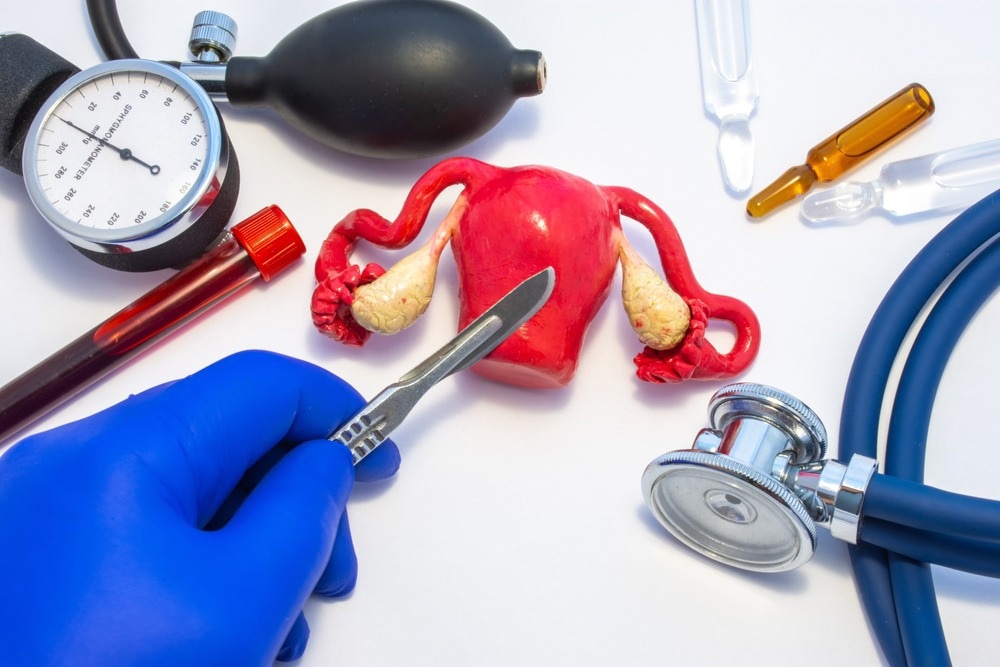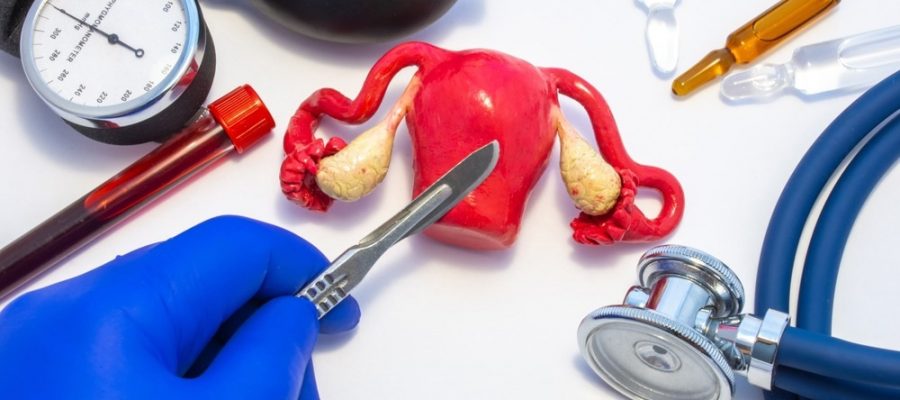Why do some women require a hysterectomy?
How are women emotionally affected after a hysterectomy?
How to help women with emotional distress after a hysterectomy
References
Further reading
Hysterectomy is a common surgical procedure that is associated with the removal of the uterus. The uterus or womb is a hollow muscular organ where a fetus grows in pregnant women. Hence, women who undergo a hysterectomy will not be able to give birth. In most cases, women undergo several emotional reactions before and after a hysterectomy.
Why do some women require a hysterectomy?
Surprisingly, hysterectomy is known to be the second most common surgery in women of childbearing age. Women with uncontrollable menstrual bleeding because of fibroids, endometriosis, or other gynecological complexities, such as cervical or uterine cancer, seek hysterectomy.

Image Credit: Shidlovski/Shutterstock.com
Scientists have estimated the prevalence of hysterectomy in the US to be 26.2%, ~22% in Australia and Ireland, 8.8% in Taiwan, and 7.5% in Singapore. Interestingly, it was observed that the patient chose a hysterectomy in most cases. This is due to years of endurance of pain during menstruation and other menstruation-related complexities, which were not resolved via various treatments. Typically, this procedure is medically recommended only in extremely severe conditions, such as uterine or cervical cancer.
How are women emotionally affected after a hysterectomy?
Hysterectomy impacts both the physical and emotional aspects of a patient. Some physical complications associated with hysterectomy are urinary incontinence, pelvic floor prolapses, and sexual dysfunction.
Culturally, the uterus has been linked with female sexuality, fertility, and a sense of femininity. As a result, it is considered an important female organ. Due to this social stigma, many women undergo significant psychological consequences, including depression, stress, and anxiety, after the removal of their uterus. Many factors are associated with why many women become depressed or feel low after a hysterectomy. These are discussed below:
Losing childbearing ability
Some women undergo hysterectomies during their childbearing years. Many of these women feel sad because they will not be able to give birth to a child in the future. Women who undergo emergency hysterectomies and are not emotionally prepared often feel a lot of grief and anger. According to a study, women who receive proper support from family and friends after a hysterectomy handle their emotional stress better.
Hormonal changes
Depending on the type of hysterectomy, an individual may have one or both ovaries removed along with the uterus. Ovaries removal in women of childbearing age triggers immediate menopause, which causes mood changes due to a decrease in estrogen levels. The sudden change in hormone levels due to menopause leads to depression, crying spells, insomnia, mood swings, and irritability.

Image Credit: MikeDotta/Shutterstock.com
According to a report by Johns Hopkins Medicine, estrogen can influence serotonin production, a feel-good chemical. A decrease in serotonin levels causes the enhancement of anxiety and sadness. This is why surgeons are against removing ovaries during hysterectomy unless the patient is pre-menopausal or has attained menopause. Post-hysterectomy, if a woman continues to experience extreme sadness, doctors might prescribe estrogen replacement therapy (ERT).
Prior emotional distress
Several studies have pointed out that if a woman experiences anxiety, depression, or other psychological problems pre-surgery, they are more likely to experience the emotional impact of a hysterectomy. Many women experience emotional distress or stress due to massive changes in their careers and family during their midlife. Hysterectomy might exacerbate stress levels in these women.
How to help women with emotional distress after a hysterectomy
It is important to make women understand that they are not alone. In the UK, around 75,000 hysterectomies are performed yearly, and many of these women report depression after the surgery. Nevertheless, depression is not an inevitable outcome of this surgery.
In the majority of cases, the emotional impact of a hysterectomy can be alleviated through counseling and a good support system. It is extremely important to have a good support system to support the patient through the emotionally difficult phase post-surgery. It is highly recommended to talk about the emotional distress to a close person like a friend or a family member so that they can provide mental support through the difficult phase.
Predicting how one's body and mind will respond to a hysterectomy is not easy. Many women recover quickly or experience little or no emotional changes after the procedure. Hence, it is important not to compare the emotional states of one woman with a hysterectomy with another, as emotional states are unique and incomparable.
Many women might feel less feminine after the surgery. These women are recommended to do certain activities, sometimes as simple as buying a dress, to speed up their emotional recovery. Several therapies (e.g., Hormone Replacement Therapy) and medicinal treatments are available to improve the mood changes experienced by women with hysterectomies.
Even though many women feel emotional and sexual changes after a hysterectomy, some remain unaffected. For instance, some women do not experience any change in their sexual desires post-surgery, while others complain of reduced desires post-surgery. Furthermore, some women with painful sexual encounters benefitted significantly after the surgery.
In a survey comprising women who underwent hysterectomy and were below 35 years of age, the majority revealed that they did not regret the procedure. Women who experienced years of painful menstruation due to the presence of a cyst or other medical conditions (e.g., heavy bleeding) often felt relieved after the procedure.
References
- Goudarzi, F. et al. (2022) Women's interdependence after hysterectomy: a qualitative study based on Roy adaptation model. BMC Women's Health, 22(1), 40. https://doi.org/10.1186/s12905-022-01615-2
- Emotional Changes After A Hysterectomy. (2022) [Online] Available at: https://www.hysterectomycentre.com/what-we-do/post-operative-advice/emotional/
- Alshawish, E. (2020) Perspective of Women about Her Body after Hysterectomy', in H. Abduljabbar (ed.), Fibroids, IntechOpen, London. 10.5772/intechopen.94260.
- Bougie, O. et al. (2020) Evaluating the Prevalence of Regret With the Decision to Proceed With a Hysterectomy in Women Younger than Age 35. Journal of Obstetrics and Gynaecology Canada, 42(3), pp. 262–268. https://doi.org/10.1016/j.jogc.2019.08.006
- Hysterectomy Experiences: Loss of Sexuality and Emotional Emptiness. (2017) (2022) [Online] Available at: https://www.hormonesmatter.com/hysterectomy-experiences-loss-sexuality-emotional-emptiness/
- Danesh, M. et al. (2015) The Effect of Hysterectomy on Women's Sexual. Function: a Narrative Review. Medical archives (Sarajevo, Bosnia and Herzegovina), 69(6), pp. 387–392. https://doi.org/10.5455/medarh.2015.69.387-392
Further Reading
- All Women's Health Content
- HIV, AIDS and Women’s Health
- The Global Health Problem of Violence Against Women
- The Role of Testosterone in Women’s Health
Last Updated: Apr 10, 2023

Written by
Dr. Priyom Bose
Priyom holds a Ph.D. in Plant Biology and Biotechnology from the University of Madras, India. She is an active researcher and an experienced science writer. Priyom has also co-authored several original research articles that have been published in reputed peer-reviewed journals. She is also an avid reader and an amateur photographer.
Source: Read Full Article
